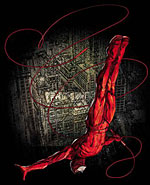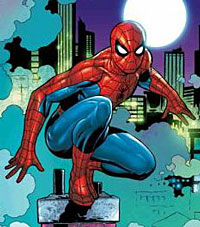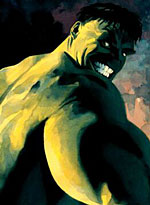>> The Friday Review: The Losers: Ante Up
>> The Friday Review: Marvels
More...

Spider-Man. Daredevil. The Hulk. What do they have in common?
If you responded either 'they're all appearing in movies' or 'hmm, Stan Lee has a lot to answer for', you'd be correct, but that's not what I'm getting at. (I could also mention that each of these characters' respective alter egos have alliterative names, but that'd be just trivia for the sake of it.)
Stumped? I'll give you a clue. Think George Michael. (No, not like that, you pervert.)
Peter Parker, Bruce Banner and Matt Murdock have each dealt with - to varying degrees - the lack of a father figure in their life. The results speak for themselves: Parker's guilt over the death of his Uncle Ben resulted in the 'power & responsibility' paradigm that Spider-Man works under. Murdock's over-developed sense of justice - stemming from his childhood, being raised by his pugilist father - led him to divide his time between being a lawyer and a vigilante. Banner's own father derided him as a freak and resented the affection mother Rebecca doted on her son, leading Brian Banner to kill his wife in a fit of jealous rage, and to be subsequently jailed as a murderer.
Ergo, the three of 'em work out their issues while beating up your usual assortment of criminals and/or super-villains. Makes sense from where I sit.
Sure, it's nothing new - Bruce "I'm Batman" Wayne paved the way for superheroics-as-therapy for decades before Lee's brainchildren came along - but the three characters I outline above got plenty of psychological mileage out of absent fathers.
 As established by Lee and Bill Everett, "Battling" Jack Murdock was a loving father who wanted the best for his son, putting him through school by means of regular boxing matches. Falling on hard times, the elder Murdock agreed to throw a fixed match, only to change his mind when he noticed young Matt in the crowd, cheering him on. He won the fight, but lost his life; backstreet retribution enacted by the match fixers. Enraged, Matt donned the DD clothes for the first time, and took his vengeance. A fairly typical origin story.
As established by Lee and Bill Everett, "Battling" Jack Murdock was a loving father who wanted the best for his son, putting him through school by means of regular boxing matches. Falling on hard times, the elder Murdock agreed to throw a fixed match, only to change his mind when he noticed young Matt in the crowd, cheering him on. He won the fight, but lost his life; backstreet retribution enacted by the match fixers. Enraged, Matt donned the DD clothes for the first time, and took his vengeance. A fairly typical origin story.
Under Frank Miller, though, embellishments were made on this: to ensure that young Matt would go on to a better life than he could provide, Jack forbade his son to play with the other children in their neighbourhood, and instead insisted that Matt study each night. Which led, in true dramatic form, to Matt being ostracised by his peers.
Miller penned and illustrated a harrowing sequence (in DAREDEVIL volume one, #191), in which, after an altercation with some young toughs, Matt returns home, justifiably proud of holding his own - only to find his father, drunk and abusive. The resulting physical violence Matt is subjected to sets his life course: he will become an attorney, in order to insure people - like his dad - follow the rules and obey the law.
It's fair to say that Murdock is at once honouring and repudiating his late father's wishes; he's a well-respected lawyer, but also clandestinely indulges in the sort of physical activity his father wanted him to avoid It's a dichotomy that allows Murdock to work out his guilt while getting his kicks. No wonder he and Spider-Man get on so well.
 Spider-Man is, naturally, the classic example of latent guilt fuelling a career in the hero business. I'm sure we all know the particulars by now: bitten by radioactive/genetically-altered spider, becomes celebrity, lapse of judgement leads to beloved uncle's murder, dedicates life to responsible use of powers. So far, so Lee and Ditko; current Spider-editor Axel Alonso refers to the character as "the perfect lapsed Catholic", in that he's always striving to atone for sins unforgiven.
Spider-Man is, naturally, the classic example of latent guilt fuelling a career in the hero business. I'm sure we all know the particulars by now: bitten by radioactive/genetically-altered spider, becomes celebrity, lapse of judgement leads to beloved uncle's murder, dedicates life to responsible use of powers. So far, so Lee and Ditko; current Spider-editor Axel Alonso refers to the character as "the perfect lapsed Catholic", in that he's always striving to atone for sins unforgiven.
This latter-day PILGRIM'S PROGRESS in tights has become reliant on using this leitmotif on a repeated basis: the guilt he feels over his uncle's death spills over into his other significant relationships, tainting them. Aunt May, Gwen Stacy, estranged wife Mary Jane Watson, the Osborn clan...yada, blah, etcetera.
It's been overused to the point of banality, and yet the recent SPIDER-MAN movie seems to have given if a fresh veneer, if not a new lease of life. (I can't honestly comment on ULTIMATE SPIDER-MAN, as I must be one of the few people left who hasn't read it.) However, in light of recent speculation regarding the launch title of Marvel's new Epic imprint, TROUBLE, we may yet see a unique angle on what has been established about Parker's family. From what I gather, Mark Millar and the Dodsons intend to depict May and Ben Parker as teenagers, with all that implies - and as such, readers may well be shown the actual origin of Peter Parker. (And if it is anywhere remotely close to what Internet scuttlebutt suggests, let me know.)
 Of course, with the incipient hype for Ang Lee's motion picture version of the Hulk, it may be hard for anyone to give a damn about comics and other such source material. (See the film of JUDGE DREDD if you don't believe me.) Lee and Kirby's rendition of the Jekyll/Hyde schism is obviously the most telling metaphor for anger directed at an absent parental figure. The gamma bomb blast only set free what was already there, according to what has been established (relatively) recently in the character's continuity; Bill Mantlo laid the foundation during his lengthy stint in the early 1980's, while Peter David took the psychological ball and ran with it during his decade-long tenure on the title.
Of course, with the incipient hype for Ang Lee's motion picture version of the Hulk, it may be hard for anyone to give a damn about comics and other such source material. (See the film of JUDGE DREDD if you don't believe me.) Lee and Kirby's rendition of the Jekyll/Hyde schism is obviously the most telling metaphor for anger directed at an absent parental figure. The gamma bomb blast only set free what was already there, according to what has been established (relatively) recently in the character's continuity; Bill Mantlo laid the foundation during his lengthy stint in the early 1980's, while Peter David took the psychological ball and ran with it during his decade-long tenure on the title.
What is interesting regarding the comic and Ang Lee's vision of same is how they appear to mirror each other regarding the use of Betty Ross (later Banner's wife, now deceased). The similarity between Betty and Rebecca Banner was hinted at by David, suggesting something of an Oedipal undercurrent - and as was so often the case, Betty would be called upon to quell the Hulk's rages. Love may not conquer all, but it can stop a tantrum that can level a city, it seems.
Now, before anyone tells me about another connection between Parker, Banner and Murdock - yes, I know that radiation was the catalyst for their powers, now siddown - it should be apparent that spider-bites, bomb-blasts and broken canisters do not superheroes make. It's anger. Anger at a world that took away beloved parents and/or relatives. What makes them heroes (or so the stories would have you believe) is their choice to channel that anger, and use their powers responsibly (or not, in the Hulk's case).
Me? I just think they could use a good therapist.

This article is Ideological Freeware. The author grants permission for its reproduction and redistribution by private individuals on condition that the author and source of the article are clearly shown, no charge is made, and the whole article is reproduced intact, including this notice.


